NCERT Solutions for Class 6 Science - Components of Food
Q1. Name the major nutrients in our food.
Ans: The major nutrients in our food are named carbohydrates, proteins, fats, vitamins, and minerals. In addition, food contains dietary fiber and water which are also needed by our body.

Q2. Name the following:
(a) The nutrients which mainly give energy to our body.
(b) The nutrients that are needed for the growth and maintenance of our body.
(c) A vitamin required for maintaining good eyesight.
(d) A mineral that is required for keeping our bones healthy.
Ans:
(a) The nutrients which mainly gives energy to our body – Carbohydrates and Fats
 View Answer
View Answer 
- Carbohydrates are the body's primary source of energy.
- They are found in foods like rice, bread, and fruits, providing the fuel needed for daily activities and bodily functions.
(b) The nutrients that are needed for the growth and maintenance of our body - Proteins
 View Answer
View Answer 
- Proteins are needed for the growth and maintenance of our body.
- Every cell in the human body contains protein.
- We need protein in our diet to help our body repair cells and make new ones.
- Eggs, milk, beans and peas are rich sources of proteins.
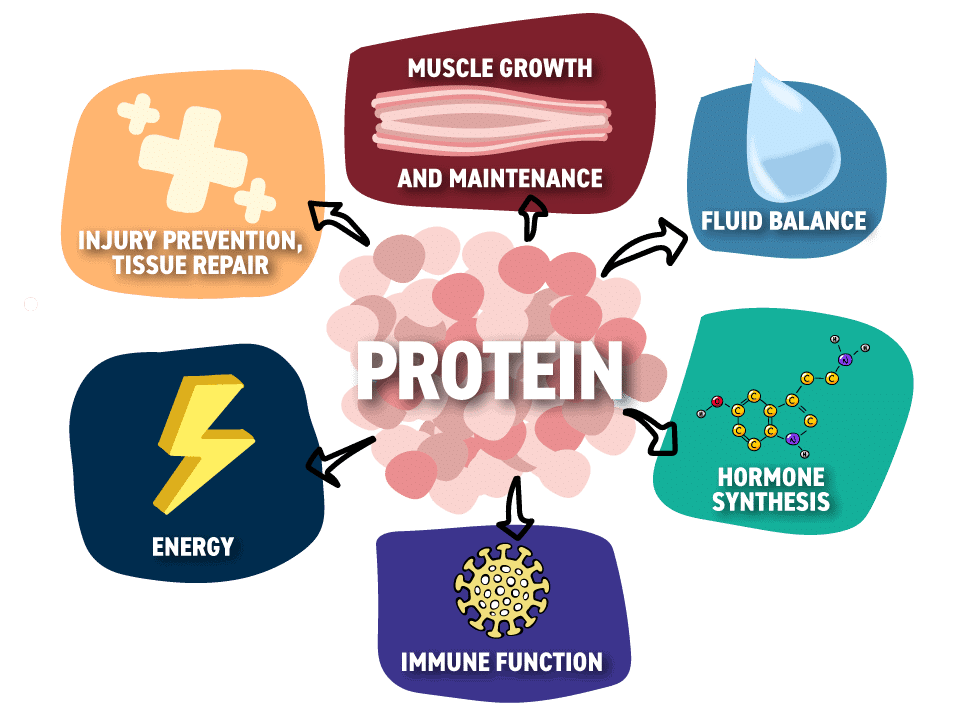 Importance of Protein
Importance of Protein
(c) A vitamin required for maintaining good eyesight - Vitamin A
 View Answer
View Answer 
- Vitamin A is crucial for good vision, especially in low light.
- It helps maintain the health of the retina and is found in foods like carrots, spinach, and dairy products.
(d) A mineral that is required for keeping our bones healthy – Calcium
 View Answer
View Answer 
- Calcium is vital for building and maintaining strong bones and teeth.
- It is also important for muscle function and nerve signaling, and it can be found in dairy products, leafy greens, and fortified foods.
Q3. Name two foods each rich in:
(a) Fats
(b) Starch
(c) Dietary fibre
(d) Protein
Ans:
(a) Fats:
Butter
- Butter is a dairy product made from cream.
- It is high in fat, which provides energy.
Nuts
- Nuts, like almonds and walnuts, contain healthy fats.
- They are also good for heart health.
(b) Starch:
Rice
- Rice is a staple food in many cultures.
- It is rich in starch, which gives us energy.
Potatoes
- Potatoes are a root vegetable packed with starch.
- They can be cooked in various ways and are very filling.
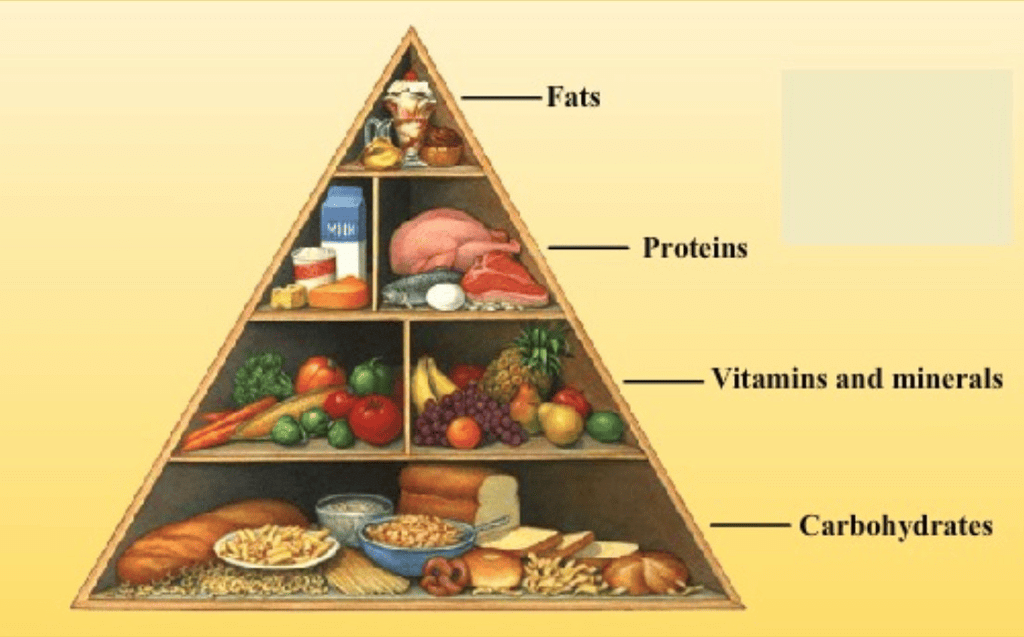 Food Pyramid
Food Pyramid
(c) Dietary Fibre:
Fruits (like apples)
- Apples are a great source of dietary fiber.
- Fiber helps in digestion and keeps you full.
Vegetables (like spinach)
- Spinach is rich in dietary fiber.
- Eating fiber-rich vegetables promotes a healthy digestive system.
(d) Protein:
Chicken
- Chicken is a type of meat that is high in protein.
- Protein is essential for building and repairing tissues in the body.
Lentils
- Lentils are legumes that are packed with protein.
- They are a great plant-based protein source for vegetarians.
Q4. Tick (√) the statements that are correct.
(a) By eating rice alone, we can fulfill the nutritional requirement of our body. ( )
(b) Deficiency diseases can be prevented by eating a balanced diet. ( )
(c) Balanced diet for the body should contain a variety of food items. ( )
(d) Meat alone is sufficient to provide all nutrients to the body. ( )
Ans:
(a)
 View Answer
View Answer 
- Rice is primarily a source of carbohydrates.
- It provides energy but lacks essential nutrients.
- Relying solely on rice can lead to nutritional deficiencies.
(b) Deficiency diseases can be prevented by eating a balanced diet. (√)
 View Answer
View Answer 
- A balanced diet includes a variety of food groups (carbohydrates, proteins, fats, vitamins, and minerals).
- It provides all necessary nutrients for the body.
- Consuming a balanced diet helps prevent deficiency diseases.
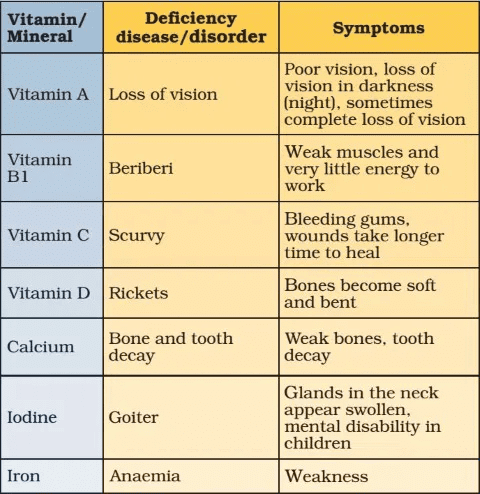 Deficiency Diseases
Deficiency Diseases
(c) Balanced diet for the body should contain a variety of food items. (√)
 View Answer
View Answer 
- A balanced diet consists of different food items from all food groups.
- This variety ensures the body receives essential nutrients.
- It promotes proper functioning and overall health.
(d) Meat alone is sufficient to provide all nutrients to the body. (X)
 View Answer
View Answer 
- Meat is a good source of protein, iron, and some vitamins.
- It does not provide all necessary nutrients.
- Important nutrients like fiber, certain vitamins (e.g., Vitamin C), and minerals are found in fruits, vegetables, and grains.
- Relying solely on meat can lead to nutritional imbalances.
Q5. Fill in the blanks.
(a) ______ is caused by a deficiency of Vitamin D.
(b) Deficiency of ______ causes a disease known as beriberi.
(c) Deficiency of Vitamin C causes a disease known as ______.
(d) Night blindness is caused due to deficiency of ______ in our food.
Ans:
(a) Rickets is caused by a deficiency of Vitamin D.
 View Answer
View Answer 
- Vitamin D is essential for calcium absorption and bone health.
- A lack of Vitamin D can lead to weakened bones and skeletal deformities in children, resulting in rickets.
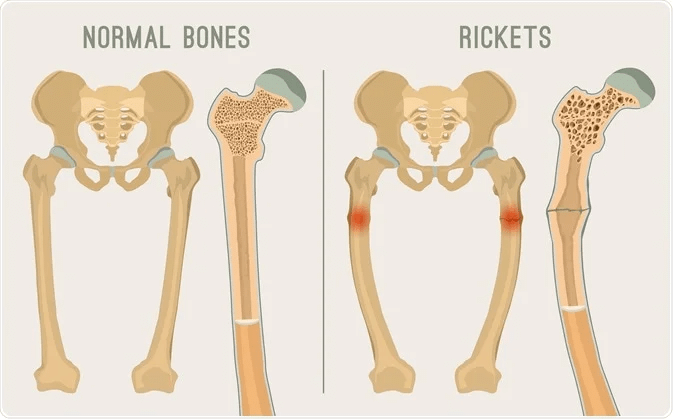 Rickets
Rickets
(b) Deficiency of Vitamin B1 causes a disease known as beriberi.
 View Answer
View Answer 
- Vitamin B1 is crucial for energy metabolism and the functioning of the nervous system.
- Beriberi can cause symptoms like weakness, nerve damage, and cardiovascular issues.
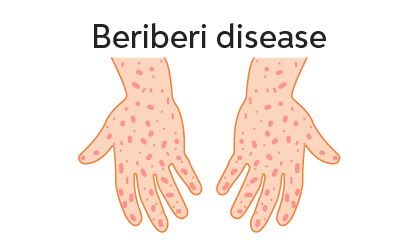 Beri Beri
Beri Beri
(c) Deficiency of Vitamin C causes a disease known as scurvy.
 View Answer
View Answer 
- Vitamin C is important for collagen synthesis, immune function, and antioxidant protection.
- Scurvy can lead to symptoms like bleeding gums, fatigue, and joint pain.
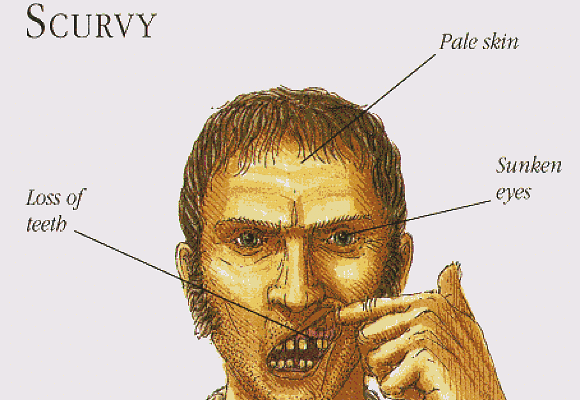 Scurvy
Scurvy
(d) Night blindness is caused due to deficiency of Vitamin A in our food.
 View Answer
View Answer 
- Vitamin A is vital for vision, especially in low-light conditions.
- A deficiency can lead to night blindness and other vision problems.
|
70 videos|150 docs|104 tests
|
FAQs on NCERT Solutions for Class 6 Science - Components of Food
| 1. What are the main components of food? |  |
| 2. Why are carbohydrates important in our diet? |  |
| 3. How do proteins benefit our body? |  |
| 4. What role do vitamins and minerals play in nutrition? |  |
| 5. Can a balanced diet provide all the necessary components of food? |  |

















